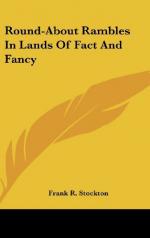[Illustration: THE ATRIUM IN THE HOUSE OF PANSA RESTORED.]
But here we are at the house of Pansa. Let us go in. We do not wait for any invitation from the owner, for he left it nearly two thousand years ago, and his descendants, if he have any, are totally ignorant of their illustrious descent. First we enter a large hall called the Atrium. You can see from the magnificence of this apartment in what style the rich Pompeiians lived. The floor is paved in black and white mosaic, with a marble basin in the centre. The doors opening from this hall conduct us to smaller apartments, two reception rooms, a parlor, the library, and six diminutive bedrooms, only large enough to contain a bedstead, and with no window. It must have been the fashion to sleep with open doors, or the sleepers must inevitably have been suffocated.
At the end of the Atrium you see a large court with a fountain in the middle. This was called the Peristyle. Around it was a portico with columns. To the left were three bedchambers and the kitchen, and to the right three bedchambers and the dining-room. Behind the Peristyle was a grand saloon, and back of this the garden. The upper stories of this house have entirely disappeared. This is a spacious house, but there are some in the city more beautifully decorated, with paintings and mosaics.
When the rubbish was cleared out of this house, much of Pansa’s costly furniture was found to be in perfect preservation, and also the statues. In the library were found a few books, not quite destroyed; in the kitchen the coal was in the fire-places; and the kitchen utensils of bronze and terra-cotta were in their proper places. Nearly all of the valuable portable things found in Pompeii have been carried away and placed in the museum at Naples.
This Pansa was candidate for the office of aedile, or mayor of the city, at the time of the eruption of Vesuvius. We know this from the placards that were found posted in various parts of the city, and which were as fresh and clean as on the day they were written. These placards, or posters, were very numerous, and there seem to have been a great many candidates for the various city offices; and it is very evident, from the inscriptions on the houses, on the walls of public buildings and the baths, that party feeling ran quite as high in this luxurious city of ancient times as it does now in any city in America. For these Pompeiians had no newspaper, and expressed their sentiments on the walls, and they have consequently come down to us of the present day.
These inscriptions not only related to politics, but referred often to social and domestic matters, and, taken in connection with the pictures of home scenes that were painted on the walls of the houses, give us such accurate and vivid accounts of the people that it is easy to imagine them all back in their places, and living the old life over again. Pansa, and Paratus, and Sallust, and Diomed, and Julia, and Sabina seem to be our own friends, with whom we have often visited the Forum or the theatre, and gone home to dine.




